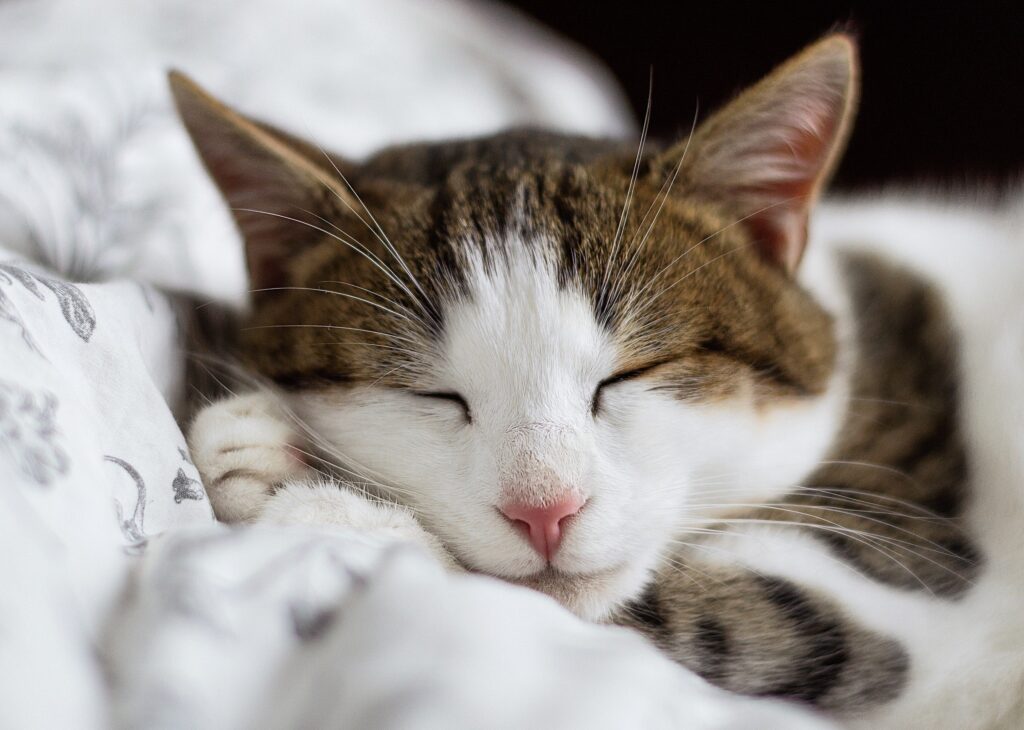
.
You’re probably familiar with the expression “cat nap,” which commonly means to enjoy a short nap between two activities. This expression differs from the reality of a cat nap, because for cats, napping is one of their primary activities. It’s easy to ask yourself “how much do cats even sleep?” when you see your cat taking their fifth nap of the day.
Cats have much different sleep requirements from humans. Here’s what you need to know about normal cat sleeping behavior for cats of all ages and how to assure your cat is getting a healthy amount of sleep.
Young kittens will sleep almost constantly. It’s not unusual for a kitten to spend 22 hours a day sleeping, being woken by their mother only to eat and be groomed. As cute as newborn kittens are, they don’t want to be disturbed during this time. They still have a lot of growing to do, and their bodies use this time to continue developing.
As kittens grow to become more independent, they’ll begin to sleep slightly less. They may also exhibit playful bouts of energy where they interact with their siblings, mother, and human caretakers a little more. Cats up to six months of age will generally sleep for about 16 hours a day, although it isn’t uncommon or unhealthy for them to sleep as much as 20 hours a day.
After six months of age, cats begin to enter adulthood. They’re capable of managing their own needs. They should be well litter trained, and they should be familiar with their sleep schedule. They’ll have a daily routine that they follow, partially set by you and partially constructed around their own desires.
During this phase of a cat’s life, it’s normal to sleep between 12 and 16 hours a day. Cats don’t usually sleep through the whole night or the whole day. Those hours will be broken up into shorter bouts of sleep, interspersed with meal times, playtime, and bathroom breaks.
Most cats are considered seniors after 10 years of age. Older cats prefer to sleep a little more. While they still enjoy and need time to run, play, and explore, they often feel less naturally inclined to independently seek these activities. Make sure you’re providing your senior cats with toys and spending plenty of time playing with them.
The sleep needs of senior cats are often similar to the needs of kittens, with seniors sleeping for as much as 20 hours a day. This usually isn’t cause for concern if a senior cat is otherwise healthy.
However, if you believe issues like joint discomfort, pain, or illness are contributing to a senior cat’s excessive sleep, bring your cat to the veterinarian. Your vet will be able to tell you if their long naps are indicative of an underlying issue.
A cat’s sleeping habits will change naturally as they age. If your cat entering adulthood is sleeping noticeably less than they did when they were a kitten, this isn’t usually anything to worry about. If your senior cat is starting to sleep a little more, this is likely just a natural part of getting older.
It’s natural for sleep patterns to change when your cat enters a new routine. If you’ve recently moved to a new house or invited a new animal in, your cat may spend more time awake until they find their footing and feel comfortable in a new situation. This should resolve within a few days to sometimes a few weeks.
If sleeping habits seem to suddenly change or if you don’t notice any discernible pattern in your cat’s behavior, it’s time to go to the veterinarian. Cats may have trouble sleeping due to newly developed discomfort or they may be sleeping more often because they feel ill. It’s best not to take chances and assume you understand what’s going on. Only your vet will be able to tell.
Cats are often ready, willing, and able to sleep just about anywhere. Although a comfortable cat bed is an excellent addition to your home, don’t be surprised if your cat doesn’t feel inclined to use it. Your cat will explore and find a place they deem comfortable enough, even if it seems strange to you.
Cats often find new sleeping spots, often in high places. They may not sleep in one place for too long. This behavior is also observed in wild cats. This could have something to do with a primal instinct that encourages cats to vary their routines to reduce their vulnerability.
Cats are both predators and prey. They have an instinct to hunt smaller prey, but they also run the risk of falling victim to larger predators. Your domestic house cat is unlikely to encounter predators, but the instinct to hide from them is still ingrained in your cat’s mentality. Sleeping in odd places is a method of making themselves more difficult for predators to access, and making their habits difficult to track.
The best thing you can do to promote restful sleep for your cat is to ensure that your cat can sleep undisturbed. This means no excessively loud noises or interruptions to their routine. If you’d like a cuddle, wait for your cat to wake up or allow your cat to sleep in an area of your home where you can easily curl up with them.
Outside of these considerations, a well-balanced diet combined with adequate exercise, 24/7 access to fresh water, and stimulation should be enough to support a healthy cat’s natural sleep cycle.
Because cats are naturally inclined to sleep so much, it can be difficult to tell if your cat is sleeping too much.
If you have concerns about the amount of sleep your cat gets, observe their behavior for a week or two and take notes. If your cat isn’t up and active as much as you feel they should be, check your cat for signs of illness, injury, or discomfort. Bring your notes and observations to your cat’s veterinarian for a proper evaluation.
If your cat is sleeping excessively simply out of boredom, get a few more toys for your household and spend some time engaging your cat in play. When your cat has an activity they particularly enjoy, they may forgo an hour or two of napping in favor of doing something exciting.
If your cat doesn’t seem to be getting enough restful sleep, make sure their environment is conducive to proper sleep. Have your cat evaluated by a veterinarian to rule out or discern any underlying medical causes that may be contributing to your cat’s inability to sleep properly.
If you find your cat’s environment is fairly relaxing but they’re still a little on edge, CBD oil can work to promote a calm mood. If temporary environmental distress, like loud storms or new houseguests, are disrupting your cat’s routine, CBD can keep your cat calm enough to rest until the situation concludes.
Sources
Preparing Your Cat for a Change in the Family | PAWS Chicago

These statements have not been evaluated by the Food and Drug Administration. These products is not intended to diagnose, treat, cure, or prevent any disease.
The world of pet wellness is always evolving. Get notified about new product launches, news, and more!
Due to state laws, we are unable to ship product to Idaho.
VetCBD products are made using hemp containing less than 0.3% THC.